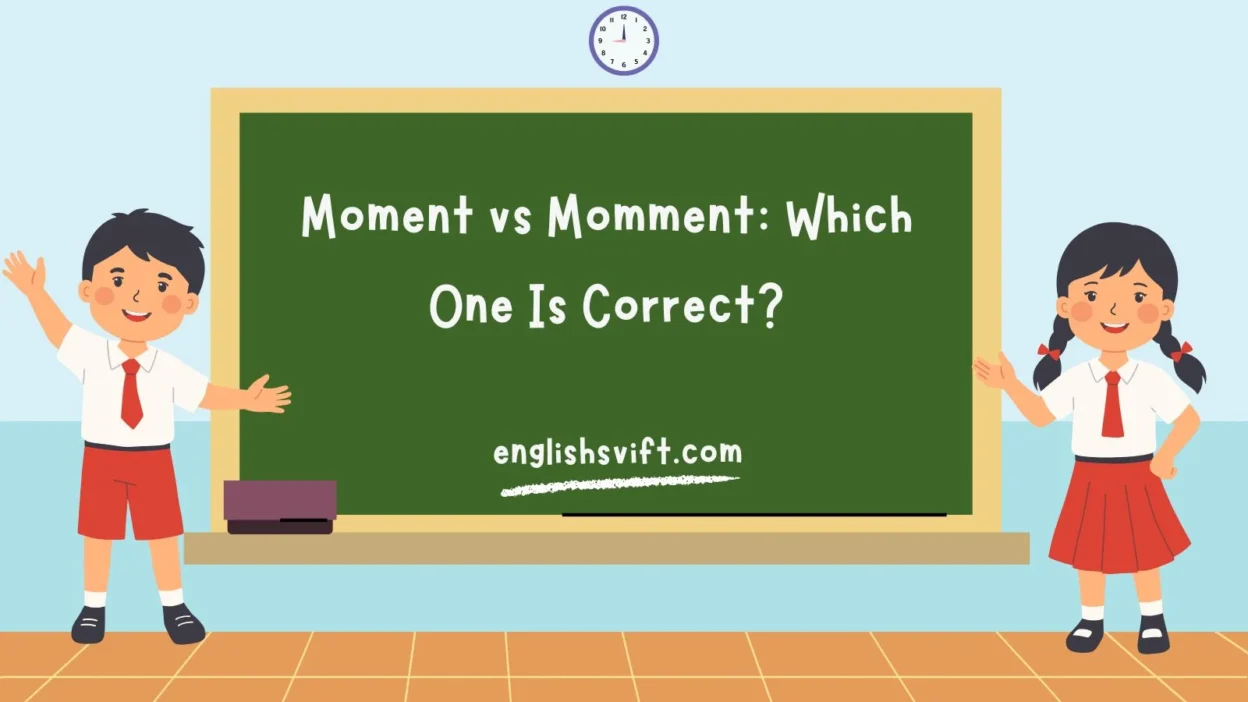Ever paused for a moment to wonder whether it’s moment or momment? In the fast-paced world of writing and communication, even a tiny spelling slip can create confusion and weaken your credibility.
The truth is, only one of these words is correct, recognized, and listed in trusted dictionaries — and the other is simply a misspelling. Yet, the two look so similar that it’s easy to mix them up, especially when typing quickly or skipping proofreading. This mix-up isn’t just a small mistake; in professional, academic, or creative contexts, it can impact how your message is understood.
In this guide, we’ll break down the meaning, usage, and importance of getting this word right, along with real-life examples, tables, and tips to make sure you never write momment again.
Whether you’re a student, professional writer, or simply someone who values accuracy, this deep dive will help you master the correct form once and for all.
Understanding the Difference Between Moment and Momment
Every so often, we encounter words that look almost identical but differ drastically in correctness. Moment and Momment are one such pair. At first glance, they appear similar — in fact, they sound the same when spoken aloud. But in the realm of writing, only one is correct and recognized.
Here’s the short truth: Moment is a valid English word listed in dictionaries. Momment is not. It’s usually a misspelling — often caused by a typing slip, lack of proofreading, or confusion about letter doubling rules in English.
The Correct Spelling: Why Moment Is the Right Choice
Moment is the accurate spelling you should always use in professional, academic, and personal writing. The word comes from the Latin momentum, meaning “movement” or “importance.”
Momment, on the other hand, is nonexistent in formal English. You won’t find it in reputable dictionaries, academic papers, or professional communication. Using “momment” in emails, reports, or published content risks credibility and professionalism.
| Word | Spelling Status | Listed in Dictionaries | Correctness Level |
| Moment | Correct | Yes | 100% Accurate |
| Momment | Incorrect | No | Misspelling |
Is Momment a Real Word or Just a Misspelling?
The verdict: Momment is simply a spelling mistake. There’s no accepted meaning, definition, or historical record of it being a separate English word.
Writers, learners, and professionals should avoid it in any formal documents, submissions, or marketing materials.
Common causes for typing “momment” instead of “moment”:
- Habitual letter doubling in other words like “summit” or “commit”
- Typing speed errors
- Autocorrect or predictive text glitches
- Misunderstanding English spelling conventions
Definitions and Meanings of “Moment” in Everyday Use
Moment is a noun with several distinct meanings, depending on context:
| Definition | Example Sentence |
| A very short period of time | “Wait a moment; I’ll be right there.” |
| A specific point in time | “It was the moment she realized the truth.” |
| A significant or decisive occasion | “That speech was a defining moment in history.” |
| Physics: a measure of turning force | “The moment applied to the lever increased the lift.” |
Typographical Errors: How “Momment” Appears in Writing
Typographical errors happen to everyone — but they’re avoidable.
“Momment” often sneaks into emails, reports, presentations, and even advertisements because the writer fails to double-check.
Avoiding this mistake means:
- Always running a spell check before submission
- Building a habit of reading aloud your writing
- Knowing common misspelling traps
| Wrong Version | Right Version | How to Remember |
| Momment | Moment | No double “m” in the middle |
Historical Origins and Etymology of “Moment”
The word moment traces back to:
- Latin: Momentum – meaning movement, importance, or influence
- Old French: Moment – adopted into Middle English without spelling changes
Historically, “moment” was linked to both time and significance — explaining why we use it for both fleeting seconds and life-changing events.
Common Contexts Where “Moment” Is Used
Moments can be brief or monumental, and the word appears in diverse contexts:
| Context | Example |
| Everyday speech | “Just a moment, please.” |
| Literature | “It was a moment of pure joy.” |
| Physics & Engineering | “The moment of inertia determines rotational stability.” |
| Emotional storytelling | “That was the moment our lives changed forever.” |
Examples of Moment in Sentences
- “We should cherish every moment we have together.”
- “This is not the right moment to make a decision.”
- “In physics, a moment refers to the effect of a force at a distance.”
- “She froze for a moment before answering.”
Why Spelling Accuracy Matters in Professional and Academic Writing
Spelling errors like “momment” may seem harmless, but they can:
- Lower grades in academic work
- Cause job application rejections
- Damage brand trust in marketing
- Reduce clarity in technical instructions
| Writing Area | Risk of Misspelling | Example Impact |
| Academic Papers | Loss of marks | “Momment” in a thesis looks careless |
| Workplace Emails | Reduced credibility | Client perceives lack of attention |
| Marketing Copy | Lower engagement | Viewers doubt professionalism |
Consequences of Using “Momment” Instead of “Moment”
- Confusion for the reader
- Misinterpretation of intended meaning
- Reduced professionalism in documents
- Negative impact on credibility and career growth
The Role of Proofreading and Review in Avoiding Misspellings
Proofreading is your first line of defense against typos like “momment.”
Tips:
- Use a dictionary check
- Ask a colleague to review important documents
- Install grammar tools like Grammarly or ProWritingAid
- Read backwards sentence by sentence — it forces focus on each word
Moment in Scientific and Technical Fields (Physics & Engineering)
In physics, “moment” isn’t just about time — it’s a technical term:
- Moment of force: A measure of rotational effect
- Moment of inertia: Resistance of an object to change in rotation
| Field | Meaning of Moment | Example |
| Physics | Rotational force | Torque is the product of force and distance |
| Engineering | Structural stability | Calculating load moments in bridges |
Emotional and Transformative Moments in Life and Literature
Moments can be fleeting yet profound, marking turning points in our personal journeys. They might be:
- The birth of a child
- A graduation day
- A decisive victory after adversity
Writers and poets often capture these moments as snapshots of human experience.
Synonyms and Related Terms for “Moment”
| Meaning | Synonyms |
| Short period | Instant, second, blink, flash |
| Important event | Milestone, occasion, landmark |
| Technical term | Torque, rotation, pivot |
Moment vs Momment: Comparison Table for Quick Reference
| Feature | Moment | Momment |
| Correctness | ✅ Correct | ❌ Incorrect |
| Dictionary-listed | Yes | No |
| Professional use | Recommended | Avoid |
| Meaning | Time, importance, force | None |
How to Remember the Correct Spelling Every Time
- Think of “moment” as mo + ment — no double m
- Visualize it as a mental snapshot in time
- Associate it with movement (same Latin root)
The Impact of Misspellings on Brand Trust and Marketing
Brands live and die by precision. Using “momment” in marketing copy can:
- Erode trust
- Suggest carelessness
- Affect search engine rankings
Using “Moment” Effectively in Storytelling and Poetry
Storytellers use moments to build emotional connection:
“It was in that single moment, beneath the rain, that he understood her silence.”
Poetry thrives on precise language — misspellings break the flow.
Cultural and Social Significance of Memorable Moments
Across cultures, moments are celebrated in:
- Weddings
- Festivals
- National holidays
- Historical commemorations
Real-Life Examples: Writers, Photographers, and Artists Capturing Moments
Photographers freeze moments in a frame. Writers preserve them in words.
From romantic sunsets to triumphant victories, these moments become art.
Grammar Tips: Noun Usage and Collocations with “Moment”
Common collocations:
- Cherish the moment
- At that moment
- A moment’s notice
- Defining moment
From Brief to Historic: The Spectrum of Moments
Not all moments are equal:
| Type of Moment | Example |
| Fleeting | “A bird landing on your hand.” |
| Historic | “Man walking on the moon.” |
Encouraging Learners to Build Spelling Proficiency
For students:
- Practice dictation
- Use spelling apps
- Read widely to reinforce correct spelling patterns
Final Word: Moment Over Momment – A Choice for Clarity and Professionalism
Choosing “moment” over “momment” is about accuracy, professionalism, and clear communication.
Misspellings can cost you grades, jobs, clients, and trust. Always double-check before hitting send.
FAQs
Q1: Is “momment” ever acceptable in informal writing?
A: No, it’s always a misspelling.
Q2: How do I quickly check if a word is correct?
A: Use an online dictionary or spell-check tool.
Q3: Can “moment” be used in physics?
A: Yes, it refers to rotational force or inertia.
Q4: Why do people double the “m” in “moment”?
A: Habit from other English words with double consonants.
Q5: Is “moment” both emotional and technical?
A: Yes — it’s used for both human experiences and scientific terms.



